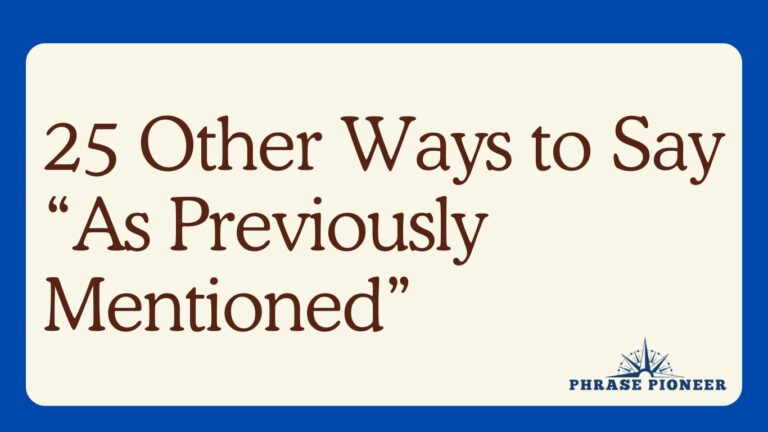22 Other Ways to Say “Please Be On Time”
Punctuality is often a key component of professionalism and courtesy. Reminding someone to be on time in varied ways can underscore the importance of timing without seeming repetitive or nagging.
Here are 22 alternative phrases to “Please be on time,” complete with example sentences and explanations to help ensure your request for timeliness is conveyed effectively and considerately.
Polite Reminders:
1. “Your promptness will be appreciated.”
- Example: “We have a tight schedule tomorrow—your promptness will be appreciated.”
- Explanation: Encourages timeliness by implying that being punctual is a valued trait.
2. “Punctuality is key for this meeting.”
- Example: “Given that we have external partners joining us, punctuality is key for this meeting.”
- Explanation: Highlights the critical nature of being on time, especially for formal occasions.
3. “Kindly ensure timely attendance.”
- Example: “We’d love to start with everyone present, so kindly ensure timely attendance.”
- Explanation: A gentle request that also conveys the importance of everyone being present from the start.
4. “Let’s aim for a sharp start.”
- Example: “Our agenda is packed, so let’s aim for a sharp start at 9 AM.”
- Explanation: Fosters a collective effort to begin an event or meeting at an exact time.
5. “Being on time would be beneficial.”
- Example: “To catch the opening remarks, being on time would be beneficial.”
- Explanation: Focuses on the advantage or benefit gained from being punctual.
Courteous Urging:
6. “I trust you’ll be there on the dot.”
- Example: “The ceremony starts promptly at noon—I trust you’ll be there on the dot.”
- Explanation: Demonstrates confidence in someone’s ability to be punctual while reminding them of the expectation.
7. “Let’s respect our agreed start time.”
- Example: “As we agreed in the schedule meeting, let’s respect our agreed start time.”
- Explanation: Reminds others of a pre-established agreement to begin at a certain time.
8. “Please consider the significance of starting on time.”
- Example: “This workshop is a rare opportunity—please consider the significance of starting on time.”
- Explanation: Encourages punctuality by bringing attention to the importance of the event.
9. “Aim to arrive with time to spare.”
- Example: “Traffic can be unpredictable, so aim to arrive with time to spare.”
- Explanation: Suggests planning for potential delays, arriving early to avoid lateness.
10. “Please join us promptly at the start.”
- Example: “Your input is invaluable, so please join us promptly at the start.”
- Explanation: Speaks to the value of the person’s presence right from the beginning.
Professional Expectations:
11. “Timeliness will be essential for the day’s success.”
- Example: “Given our tight schedule, timeliness will be essential for the day’s success.”
- Explanation: Connects being on time directly with the achievement of the day’s goals.
12. “We count on your punctual arrival.”
- Example: “Your leadership sets the tone—we count on your punctual arrival.”
- Explanation: Signifies reliance on someone’s timely presence, which may have a larger impact.
13. “Please adhere to the designated start time.”
- Example: “To honor everyone’s commitments, please adhere to the designated start time.”
- Explanation: Requests respect for the timetable set for an event or meeting.
14. “We aspire to commence precisely at the agreed time.”
- Example: “In respect to all participants, we aspire to commence precisely at the agreed time.”
- Explanation: Highlights a collective ambition to begin at a certain time.
15. “It is imperative to be on time for this occasion.”
- Example: “Due to the live broadcast, it is imperative to be on time for this occasion.”
- Explanation: Emphasizes the utmost importance of punctuality for a specific situation.
Friendly Nudges:
16. “Looking forward to a punctual kickoff.”
- Example: “We’re all excited about the project launch, looking forward to a punctual kickoff.”
- Explanation: Combines the anticipation of an event with the expectation of timeliness.
17. “Early arrival is much appreciated.”
- Example: “Considering our packed agenda, early arrival is much appreciated.”
- Explanation: Encourages arrival before the scheduled time, nudging towards punctuality.
18. “We’re aiming for an on-the-hour start.”
- Example: “Breakfast will be served early as we’re aiming for an on-the-hour start.”
- Explanation: Specifies the intention to start exactly as the clock strikes a certain hour.
19. “Please honor the start time.”
- Example: “To ensure we give everyone speaking time, please honor the start time.”
- Explanation: Appeals to one’s sense of accountability to others by being punctual.
20. “Let’s not keep anyone waiting.”
- Example: “We all have busy schedules; let’s not keep anyone waiting.”
- Explanation: Advocates for timely arrival out of respect for everyone’s time.
Direct Appeals:
21. “Promptness will support our agenda’s flow.”
- Example: “We have a number of important topics to cover—promptness will support our agenda’s flow.”
- Explanation: Presents being on time as a support mechanism for the day’s proceedings.
22. “Your timely presence is crucial.”
- Example: “As key stakeholders, your timely presence is crucial to the dialogue.”
- Explanation: Expresses the critical role that one’s punctual attendance plays in the event’s dynamic.
Choosing the right phrase to encourage punctuality can contribute to a respectful and effective reminder that honors the value of everyone’s time.
Whether the emphasis is on mutual respect, the importance of the scheduled meeting, or a direct appeal to individual responsibility, a thoughtfully phrased reminder can improve the chances of a prompt start and successful outcome.






